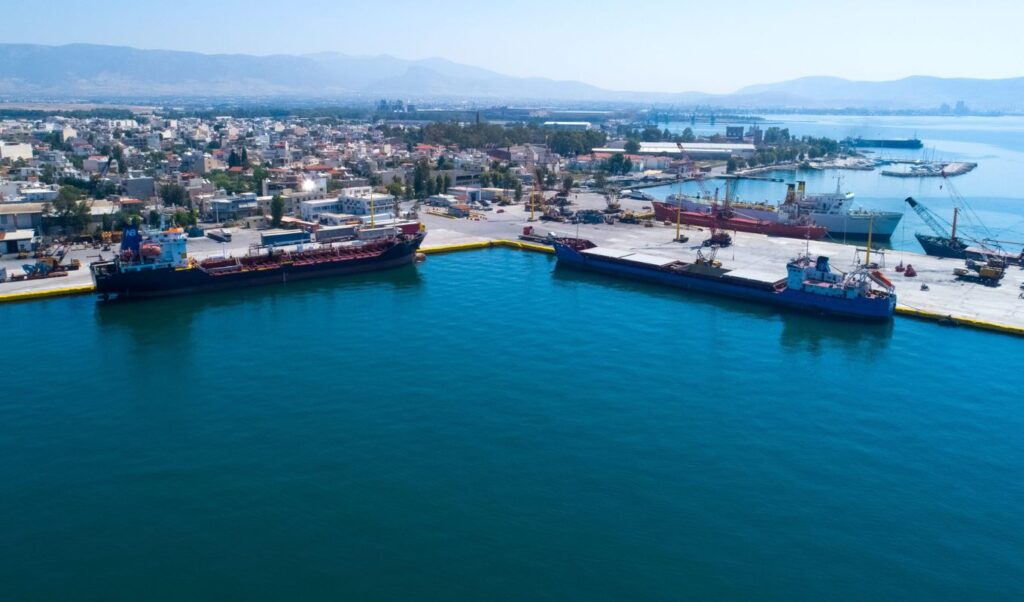Greece’s strategic upgrade, transforming from a small European transit station into an energy hub, certifies the deep and substantial cooperation between Greece and the United States, according to many analysts. The American investment in the port of Elefsina and the coastal zone, which includes the railway connection of Piraeus and Elefsina Shipyards with the Thriasio Plain, strengthens Greece’s strategic position following recent energy agreements.
International relations expert Alexandros Despotopoulos analyzes for parapolitika.gr how the utilization of Elefsina port breaks the “monopoly” of Piraeus port and gives our country the opportunity to acquire a second port hub. As he states, “what will function as a counterbalance for the US is an opportunity for us. We acquire a second major port. This means we no longer depend on what COSCO will do in Piraeus, whether it will build a fourth platform, whether it will make investments. And at a geopolitical level, we can now play between the Chinese and American poles. This is extremely important.
At the same time, Greece is being upgraded to a regional logistics and energy hub. Because when, in addition to Chinese-controlled Piraeus, you add Elefsina, which won’t be just a simple port but will have shipyards, a commercial center, and we want it to have railway connections, we’re actually building a multinational gateway to the Balkans and Central Europe. Thus, our own narrative in logistics deepens, because we want to function as energy hubs in the Eastern Mediterranean. We shouldn’t overlook the investments that will be made there, the jobs that will be created. Let’s remember that the U.S. International Development Finance Corporation has committed $125 million for the shipyards alone for investments.”
The connection between Greece’s geopolitical upgrade and Turkey
According to some analysts, Greece’s geopolitical upgrade comes as a consequence of Turkey’s refusal to disengage from agreements it has concluded with Russia in the energy sector, while many are trying to explore conditions that will be created post-war and whether Greece will continue to attract investor interest even then.
Mr. Despotopoulos refers to a new parameter contributing to Greece’s upgrade and expected to give it lasting value, because, as he argues, “the Vertical Corridor currently envisions a rapid railway connection between Ukraine and Alexandroupoli. Goods currently transported through Turkey’s straits, the Bosphorus, which require about five days to pass, the rapid railway alternative, the so-called Sea to Sea, meaning Black Sea to Alexandroupoli, will require only 18 hours or 12 if we’re talking about Bulgaria-Romania. This operates completely competitively against the Straits and will have many comparative advantages in cost, time, security. And long-term, even if the war ends, you have an alternative that is more resilient under relative conditions, much faster and much more economical. So we already see something being created that reduces Turkey’s value in the region and increases Greece’s. Greece’s position is inherently competitive in energy matters compared to Turkey’s position, because the energy projects it implements are competitive to Turkey’s. We, for example, invested in American cooperation and the 3+1 doctrine, involving Cyprus, Israel and us. In time, we hope to also have the Vertical Axis from India. Turkey relied on competitive plans that included a Russian hub in Eastern Thrace, as well as transporting Qatari oil through pipelines. All these didn’t flourish, precisely because the Americans are now investing in supply corridors to Europe that mainly involve Greece.”
However, Turkey’s interest in entering America’s energy plans is, for some analysts, a scenario we might see unfolding in the near future. According to Mr. Despotopoulos, “it would be wishful thinking for Turkey to leave cooperation with Russia.” As he tells parapolitika.gr, “Turkey first of all officially declared today its position that it won’t stop buying natural gas from Russia and, secondly, has active contracts with Americans for LNG supply, but they’re not that strong. The supply of some natural gas from the US that will be liquefied isn’t such as to endanger all these energy plans. Also, it would be wishful thinking for Turkey to abandon irrationality, to leave cooperation it had with Russia, which is also a revisionist power, to abandon revisionism and come discuss on the basis of International Law with Greece and the legitimate Republic of Cyprus. I don’t think it will do that. Precisely because it won’t do that, it will continue to find itself outside major energy planning.”
Despotopoulos: Elefsina’s emergence as new transit pole of American interests doesn’t hinder COSCO’s development at Piraeus port
Regarding China’s reaction to Elefsina’s emergence as a new transit pole of American interests, Mr. Despotopoulos argues that “it doesn’t hinder COSCO’s development at Piraeus port in any way. We have excellent cooperation, there’s no reason for them to react. We haven’t committed to the Chinese or to any third party that we won’t further develop other ports in our country. And generally we see such moves happening in the Netherlands and other countries. China would have reason to be bothered if we created any difficulty in their project. Greece doesn’t do that. Greece honors its agreement with China, it’s a mature democracy. It’s part of the western world.”




